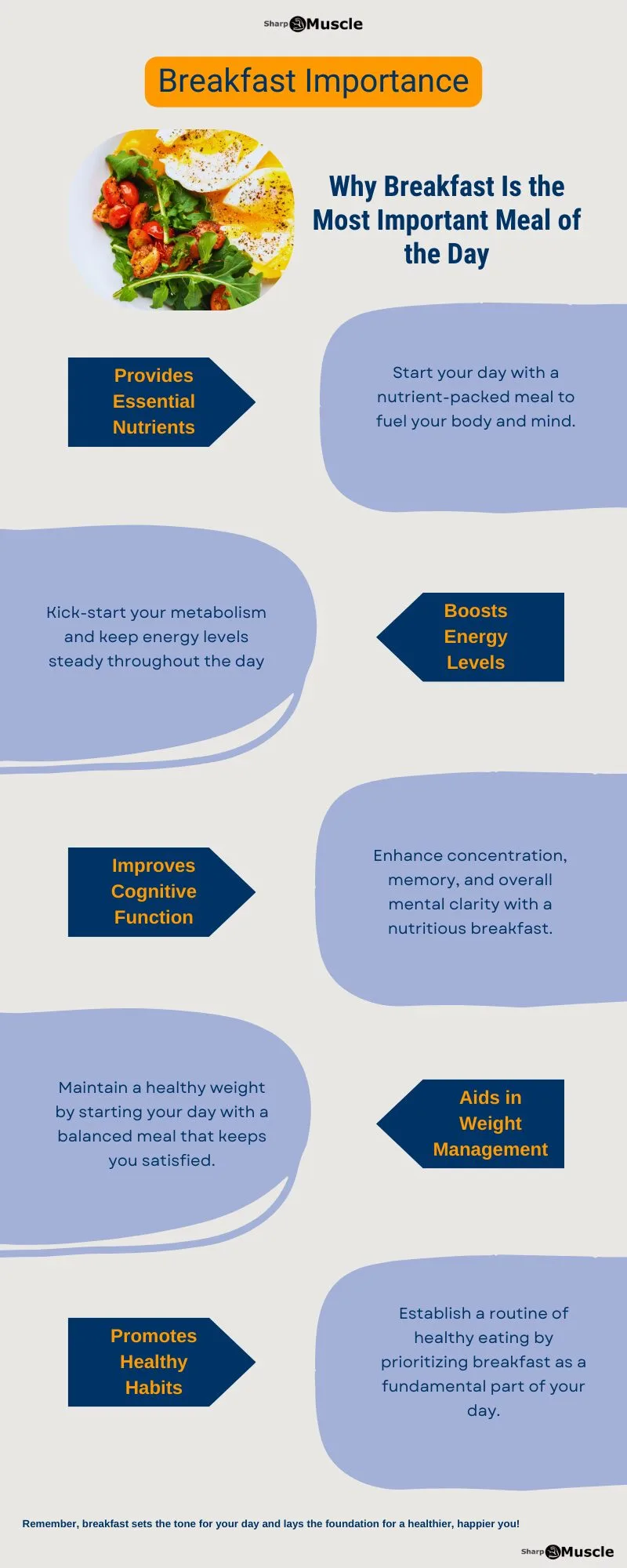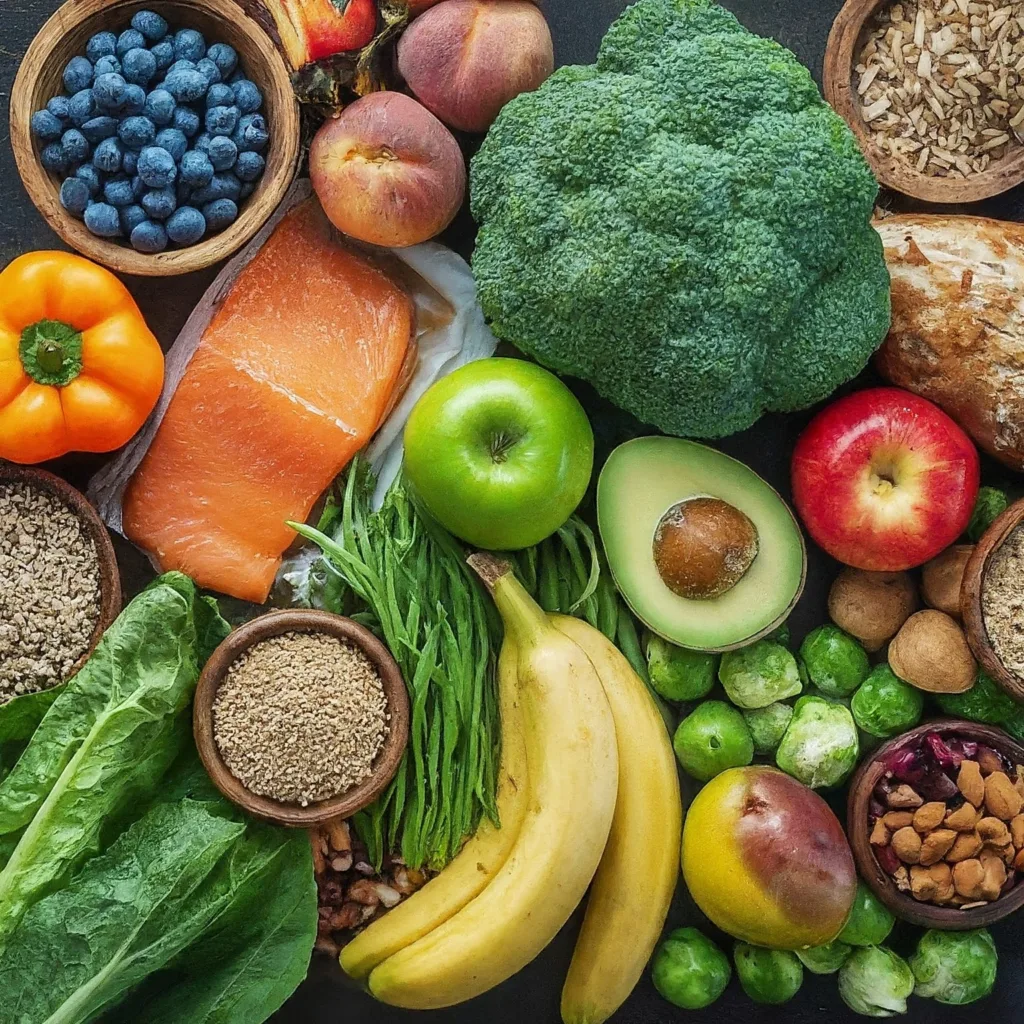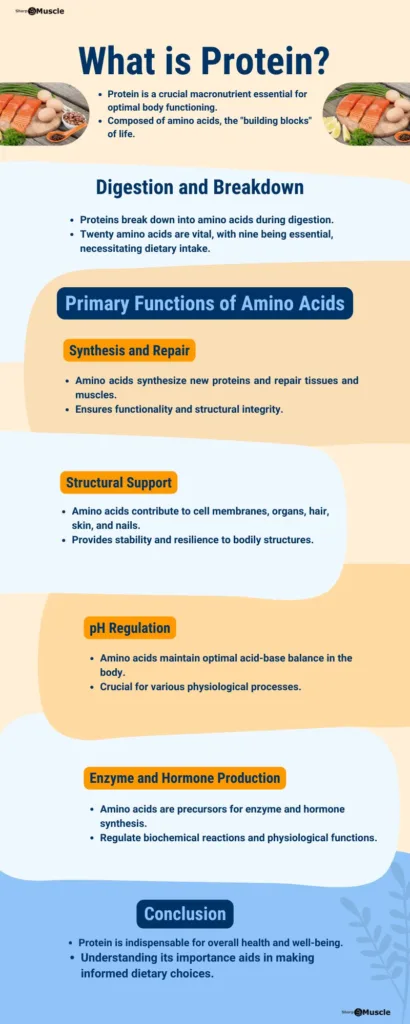In our exploration of “Breakfast Importance,” the cornerstone of a healthy start to your day. You’ve probably heard the saying, ‘Breakfast is the most important meal of the day.’ But why is it crucial? Let’s take a closer look. Skipping breakfast deprives your body of essential energy and nutrients. Without it, you may fall short on daily fiber, vitamins, and minerals.
Let’s ensure you’re equipped with the fuel you need to conquer the day ahead.
In This “Breakfast Importance”
Evidence in Support of Breakfast Importance
Support for the importance of breakfast largely stems from observational studies, which, while informative, cannot establish a direct cause-and-effect relationship. For instance, a comprehensive 2021 systematic review1 of 14 observational studies revealed that individuals consuming breakfast seven days a week showed reduced susceptibility to various health issues, including heart disease, diabetes, obesity, high blood pressure, stroke, abdominal obesity, cardiovascular-related mortality, and elevated LDL cholesterol levels.
Nonetheless, it’s essential to note that these findings only indicate an association between breakfast consumption and decreased risk of cardiovascular and metabolic diseases. 2 They do not definitively establish breakfast as the causal factor.
Conversely, an examination of data encompassing over 30,000 individuals from North America demonstrated that individuals who forego breakfast may inadvertently deprive themselves of essential nutrients. 3 Those abstaining from breakfast commonly exhibited deficiencies in key nutrients such as folate, calcium, iron, vitamin A, and vitamins B1, B2, B3, C, and D.
Moreover, a randomized control trial conducted in 2017, involving 18 participants with type 2 diabetes and 18 healthy counterparts, underscored the impact of breakfast omission on circadian rhythms. 4 5
Both groups exhibited disrupted internal clocks when breakfast was skipped, accompanied by heightened postprandial spikes in blood glucose levels. Consequently, the study’s authors advocate for breakfast consumption to maintain optimal circadian rhythm functionality.
Why Breakfast the Most Important Meal of the Day
Often hailed as “the most important meal of the day,” breakfast holds significance for various reasons. Breaking the overnight fast, it replenishes glucose levels, boosting energy and providing essential nutrients crucial for health. While breakfast offers a chance to nourish our bodies with essential nutrients, recent research suggests it might not hold the utmost significance among meals. Listening to your body’s hunger signals and having breakfast when hungry is crucial.
Yet, if circumstances lead you to skip breakfast occasionally, there’s no need for remorse. However, consistent breakfast skippers should focus on maximizing nutrient intake during other meals. Additionally, individuals like fitness enthusiasts or early-morning athletes may find breakfast beneficial for their performance.
As the cornerstone of your day’s nutrition, breakfast delivers essential nutrients, boosts energy, and supports cognitive function. Breakfast importance establishes healthy habits and strengthens social connections, enriching overall well-being.

1. Provides Essential Nutrients
Breakfast jumpstarts your metabolism following an overnight fast, revving up your body’s energy expenditure for the day ahead. This metabolic boost helps regulate blood sugar levels and facilitates efficient nutrient absorption.
As for the nutrients breakfast foods offer, they’re essential for maintaining optimal health and function. Fiber aids in digestion and promotes satiety, while vitamins and minerals play crucial roles in various bodily processes.
Here are some breakfast foods rich in key nutrients:
- Whole grain cereals: Packed with fiber, vitamins, and minerals like iron and B vitamins.
- Greek yogurt: A good source of protein, calcium, and probiotics for gut health.
- Eggs: Provide high-quality protein, vitamins such as vitamin D and B12, and essential minerals like selenium and choline.
- Oatmeal: Rich in fiber, particularly soluble fiber, which helps lower cholesterol levels and regulate blood sugar.
- Berries: Loaded with antioxidants, vitamins, and fiber, berries are a nutritious addition to any breakfast.
- Nuts and seeds: Provide healthy fats, protein, and a variety of vitamins and minerals, including magnesium and zinc.
- Whole grain toast: Offers fiber and complex carbohydrates for sustained energy throughout the morning.
- Leafy greens: Add nutrients like folate, vitamin K, and antioxidants to breakfast smoothies or omelets.
- Avocado: A source of healthy fats, fiber, and vitamins like vitamin E and potassium.
- Salmon: Rich in omega-3 fatty acids, protein, and vitamin D, salmon is a nutritious option for breakfast.
Incorporating these nutrient-rich foods into your breakfast can help you start your day on a healthy and balanced note.
2. Boosts Energy Levels
Breakfast serves as the fuel that powers both your body and brain for the day ahead. By providing essential nutrients and energy, a nutritious breakfast kick-starts your metabolism, ensuring optimal function throughout the day.
Moreover, maintaining stable blood sugar levels is crucial for sustained energy and focus. 6 Maintaining balanced blood sugar levels offers significant health benefits in both the short and long term. In the short term, you can expect increased energy, stabilized mood, better sleep, reduced cravings, and potential weight loss.
Over time, stable glucose levels contribute to lower risks of heart disease, improved skin health, reversal of insulin resistance in type 2 diabetes, enhanced gut health, and potentially reduced risks of chronic conditions like Alzheimer’s and dementia.
A balanced breakfast, rich in complex carbohydrates, protein, and healthy fats, helps regulate blood sugar levels, preventing energy crashes and promoting mental clarity. Thus, starting your day with a nutritious breakfast sets the stage for improved productivity, concentration, and overall well-being.
3. Improves Cognitive Function
Consuming breakfast has been consistently associated with improved cognitive function, including enhanced memory, focus, and overall mental clarity. By providing essential nutrients and regulating glucose metabolism, breakfast supports optimal brain function, facilitating better cognitive performance throughout the day.
Several studies have established a strong link between breakfast consumption and improved cognitive performance and concentration. Breakfast serves as fuel for the brain, providing essential nutrients and energy needed for optimal cognitive function. 7 8
Research indicates that individuals who eat breakfast regularly tend to demonstrate better memory retention, increased focus, and enhanced mental clarity compared to those who skip this meal. 9 10
Moreover, breakfast supports neurotransmitter production and regulation, which are vital for maintaining attention and cognitive function throughout the day. The nutrients found in breakfast foods, such as carbohydrates, proteins, and healthy fats, play key roles in neurotransmitter synthesis and signaling pathways.
Additionally, breakfast influences glucose metabolism, ensuring a steady supply of glucose to the brain, which is its primary source of energy. Stable blood sugar levels obtained from a nutritious breakfast contribute to sustained mental alertness and cognitive performance. 8
4. Aids in Weight Management
There’s a common misconception that skipping breakfast can aid in weight loss, but research suggests otherwise. 11
Numerous studies have found a strong association between regular breakfast consumption and a lower risk of obesity, as well as better weight management overall. 12 13
Skipping breakfast may lead to increased hunger and cravings later in the day, potentially resulting in overeating or making less nutritious food choices. Moreover, when breakfast is skipped, there’s a tendency to compensate by consuming larger portions at subsequent meals, which can contribute to weight gain over time.
On the contrary, regularly eating a balanced breakfast helps regulate appetite and stabilize blood sugar levels, reducing the likelihood of overeating later in the day. Furthermore, breakfast consumption is linked to improved metabolism and increased physical activity levels, both of which support weight management efforts.
Bottom line
5. Promotes Healthy Habits
Breakfast plays a pivotal role in establishing a routine of healthy eating, setting a positive tone for overall dietary choices throughout the day. Starting your morning with a nutritious meal not only provides essential nutrients and energy but also sets the stage for making healthier food choices later on.
Research suggests that individuals who eat breakfast regularly are more likely to consume a balanced diet rich in fruits, vegetables, whole grains, and lean proteins. By kickstarting the day with a nutritious meal, you’re more inclined to prioritize healthful options for subsequent meals and snacks.
Moreover, breakfast consumption has been linked to improved self-control and reduced impulsivity when it comes to food choices. 14 Starting your day with a nutritious breakfast helps regulate appetite and cravings, making it easier to resist unhealthy temptations later in the day.
Incorporating a variety of nutrient-dense foods into your breakfast, such as fruits, vegetables, whole grains, and lean proteins, provides a solid foundation for overall dietary health. By making a breakfast importance and choosing nourishing options, you’re laying the groundwork for a pattern of healthy eating that can positively impact your well-being in the long run.
6. Fosters Family and Social Connections
The cultural and social aspects of breakfast extend beyond mere sustenance, encompassing cherished rituals like family meals and brunch gatherings. Sharing breakfast with loved ones fosters connections and strengthens relationships, fostering a sense of unity and belonging within communities.
Family breakfasts provide valuable opportunities for bonding and communication, allowing members to start their day together and share experiences. Whether it’s enjoying a homemade meal around the kitchen table or savoring brunch at a favorite spot, these moments create lasting memories and deepen familial ties.
Similarly, brunch gatherings with friends or colleagues offer chances for social interaction and camaraderie. Breaking bread together over a leisurely meal encourages conversation and laughter, fostering friendships and nurturing a sense of community.
Moreover, the act of sharing food has long been recognized as a symbol of hospitality and goodwill in many cultures. Inviting others to join you for breakfast demonstrates warmth and generosity, strengthening interpersonal connections and promoting inclusivity.
Bottom line
Discovering What Suits You Best: Enjoying Breakfast Importance in Your Fitness Plan
In the realm of nutrition, recent studies underscore that a universal approach isn’t applicable; instead, individualized strategies prevail. Achieving optimal health hinges on embracing a wholesome lifestyle tailored to your unique needs.
Here are some avenues to enhance your well-being15:
- Engage in at least 150 minutes of moderate physical activity weekly
- Incorporate strength training exercises targeting major muscle groups bi-weekly
- Maintain a balanced weight conducive to your body’s needs
- Moderate your intake of added sugars, saturated fats, and processed foods
- Diversify your diet with nutrient-rich foods
- Listen to your body’s cues for hunger and satiety
- Hydrate adequately with water throughout the day
- Steer clear of tobacco products and excessive alcohol consumption
- Ensure you get a minimum of 7 hours of sleep within a 24-hour cycle 16
Conclusion
Breakfast plays a vital role in maintaining overall health and fitness. It provides essential nutrients, fuels the body and brain, supports cognitive function, aids in weight management, promotes healthy habits, and fosters social connections. I urge you to prioritize breakfast as a cornerstone of your daily routine to unlock optimal health and vitality. By starting your day with a nutritious breakfast, you set yourself up for success and pave the way for a healthier, more energized life.
While recent research may suggest that breakfast isn’t necessarily the most critical meal of the day, its importance remains undeniable. It presents a valuable opportunity to fuel your body and provide essential nutrients crucial for optimal functioning.
Opting out of breakfast shouldn’t elicit feelings of guilt, as there’s limited evidence to suggest significant negative impacts on health. What truly matters is finding an eating pattern that aligns with your individual needs while maintaining a healthy lifestyle and ensuring adequate nutrient intake throughout the day.
If you’re struggling to meet your nutritional requirements, seeking guidance from a registered dietitian can provide valuable insights and support to help you navigate your dietary choices effectively.
- Li ZH, Xu L, Dai R, Li LJ, Wang HJ. “Effects of regular breakfast habits on metabolic and cardiovascular diseases: A protocol for systematic review and meta-analysis.” Medicine (Baltimore). 2021 Nov 5;100(44):e27629. doi: 10.1097/MD.0000000000027629. PMID: 34871228; PMCID: PMC8568444.[↩]
- Maki KC, Phillips-Eakley AK, Smith KN. “The Effects of Breakfast Consumption and Composition on Metabolic Wellness with a Focus on Carbohydrate Metabolism.” Adv Nutr. 2016 May 16;7(3):613S-21S. doi: 10.3945/an.115.010314. PMID: 27184288; PMCID: PMC4863265.[↩]
- Fanelli S, Walls C, Taylor C. “Skipping breakfast is associated with nutrient gaps and poorer diet quality among adults in the United States.” Proceedings of the Nutrition Society. 2021;80(OCE1):E48. doi: 10.1017/S0029665121000495.[↩]
- Daniela Jakubowicz, Julio Wainstein, Zohar Landau, Itamar Raz, Bo Ahren, Nava Chapnik, Tali Ganz, Miriam Menaged, Maayan Barnea, Yosefa Bar-Dayan, Oren Froy; “Influences of Breakfast on Clock Gene Expression and Postprandial Glycemia in Healthy Individuals and Individuals With Diabetes: A Randomized Clinical Trial.” Diabetes Care 1 November 2017; 40 (11): 1573–1579. DOI: 10.2337/dc16-2753.[↩]
- National Institute of General Medical Sciences. (n.d.). National Institute of General Medical Sciences (NIGMS). “Circadian Rhythms.”[↩]
- Ke X, Yang M. “[Effects of breakfast quality on blood glucose level in students].” Zhonghua Yu Fang Yi Xue Za Zhi. 1997 Jul;31(4):218-20. Chinese. PMID: 9812581.[↩]
- Galioto R, Spitznagel MB. “The Effects of Breakfast and Breakfast Composition on Cognition in Adults.” Adv Nutr. 2016 May 16;7(3):576S-89S. doi: 10.3945/an.115.010231. PMID: 27184286; PMCID: PMC4863263.[↩]
- Chianese R, Coccurello R, Viggiano A, Scafuro M, Fiore M, Coppola G, Operto FF, Fasano S, Laye S, Pierantoni R, Meccariello R. “Impact of Dietary Fats on Brain Functions.” Curr Neuropharmacol. 2018;16(7):1059-1085. doi: 10.2174/1570159X15666171017102547. PMID: 29046155; PMCID: PMC6120115.[↩][↩]
- Tang Z, Zhang N, Liu A, Luan D, Zhao Y, Song C, Ma G. “The effects of breakfast on short-term cognitive function among Chinese white-collar workers: protocol for a three-phase crossover study.” BMC Public Health. 2017 Jan 18;17(1):92. doi: 10.1186/s12889-017-4017-1. PMID: 28100212; PMCID: PMC5241917.[↩]
- Adolphus K, Lawton CL, Dye L. “The effects of breakfast on behavior and academic performance in children and adolescents.” Front Hum Neurosci. 2013 Aug 8;7:425. doi: 10.3389/fnhum.2013.00425. PMID: 23964220; PMCID: PMC3737458.[↩]
- Zeballos E, Todd JE. “The effects of skipping a meal on daily energy intake and diet quality.” Public Health Nutr. 2020 Dec;23(18):3346-3355. doi: 10.1017/S1368980020000683. Epub 2020 May 13. PMID: 32398192; PMCID: PMC10200470.[↩]
- Wicherski J, Schlesinger S, Fischer F. “Association between Breakfast Skipping and Body Weight-A Systematic Review and Meta-Analysis of Observational Longitudinal Studies.” Nutrients. 2021 Jan 19;13(1):272. doi: 10.3390/nu13010272. PMID: 33477881; PMCID: PMC7832891.[↩]
- Arora M, Nazar GP, Gupta VK, Perry CL, Reddy KS, Stigler MH. “Association of breakfast intake with obesity, dietary and physical activity behavior among urban school-aged adolescents in Delhi, India: results of a cross-sectional study.” BMC Public Health. 2012 Oct 17;12:881. doi: 10.1186/1471-2458-12-881. PMID: 23075030; PMCID: PMC3549919.[↩]
- Marques ICF, Ting M, Cedillo-Martínez D, Pérez-Cueto FJA. “Effect of Impulsivity Traits on Food Choice within a Nudging Intervention.” Nutrients. 2020 May 14;12(5):1402. doi: 10.3390/nu12051402. PMID: 32423143; PMCID: PMC7285079.[↩]
- Physical Wellness Toolkit. (2023, August 4). National Institutes of Health (NIH). Available from: https://www.nih.gov/health-information/physical-wellness-toolkit.[↩]
- How Much Sleep Do I Need? (2022, September 14). Centers for Disease Control and Prevention. Available from: https://www.cdc.gov/sleep/about_sleep/how_much_sleep.[↩]















